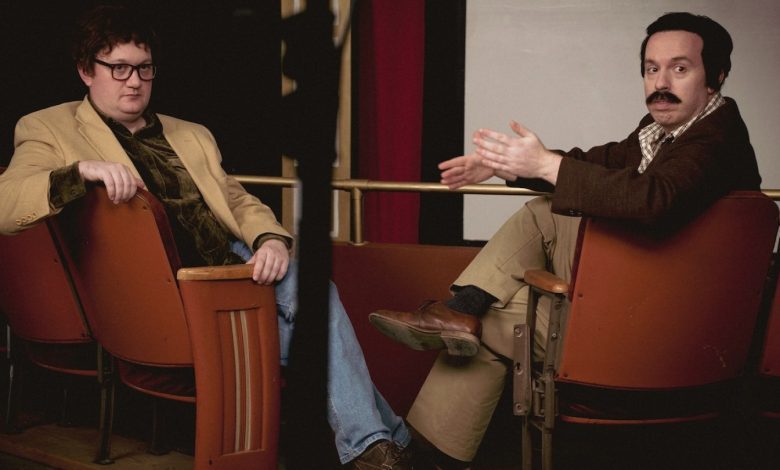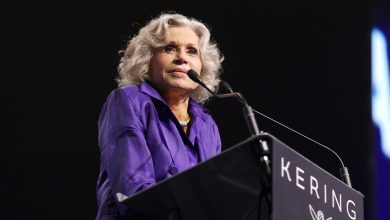Siskel and Ebert’s 50th Anniversary Celebrated on Stage in Chicago

Exactly 50 years after their first joint TV appearance on Chicago’s public TV station, Gene Siskel and Roger Ebert’s legacy received a heartfelt celebration Saturday in their hometown — including a live stage performance of the pair’s on-screen dynamic.
The show, starring Zack Mast and Stephen Winchell (both veterans of Chicago’s comedy and improv community), looked back on the early years of their TV pairing. Siskel (Winchell) and Ebert (Mast) presented it as a special episode of their show Sneak Previews, presenting clips of their own work and commenting on how their relationship grew and changed over those years — and how they went from very stiff TV performers at first to, with the help of producer Thea Flaum, the iconic faces of film criticism in the United States.
The show is part of a month-long celebration of Siskel and Ebert that has also included weekly screenings of films they championed on TV and in print: Eve’s Bayou, Breaking Away, Drugstore Cowboy and, concluding the series on Nov. 25, John Sayles’ Lone Star.
“The programming developed by the Chicago Department of Cultural Affairs’ Chicago Film Office to honor Gene Siskel and Roger Ebert stands as a testament to their lasting cultural impact. By reviewing films through accessible, authentic conversation, they transformed the way the world engages with cinema,” Kenya Merritt, acting commissioner of the Chicago Department of Cultural Affairs and Special Events, said in a statement. “Their dialogue helped elevate Chicago as a global hub for thoughtful, passionate film discussion and as a place that champions emerging artists. As we celebrate their 50-year legacy, we also honor the generations of filmmakers, critics, and audiences they inspired. Their influence continues to shape how we uplift storytelling and creative innovation here in Chicago.”
Saturday was not the first time Winchell and Mast had played Siskel and Ebert on stage: Last year, they did a performance at a local theater that re-created an infamous 1987 episode of their show (then titled Siskel & Ebert & the Movies and in national syndication). The director of that show, Kaitlin Schneider, was also working on the 50th anniversary performance with producers Paul Durica and Meredith Milliron, and through her Winchell and Mast came aboard.
The pilot episode of Siskel and Ebert’s show, then called Opening Soon at a Theater Near You, aired the day before Thanksgiving in 1975 — and it was not great. “They are so bad in that first episode,” Winchell told The Hollywood Reporter a few days before Saturday’s performance. “It is shameful how stiff and wooden they were. It’s a very, very far cry from even just a couple years later, when they’re really hitting their stride and being the people we all know.”
The re-created clips in the live show — as well as Siskel and Ebert’s commentary on them — emphasize how they adapted to being on TV. In a 1976 episode where they discuss Taxi Driver, both men come across as disinterested and aloof, but in clips from just a couple years later, they’re talking to rather than at each other and engaging in the debates that made them famous.
Both actors say they spent a lot of time on YouTube studying how Siskel and Ebert presented themselves and the way they interacted. They also took inspiration from Josh Schollmeyer’s oral history Enemies, A Love Story and Matt Singer’s book Opposable Thumbs.
“Playing Gene, I wanted to get the mannerisms down,” Winchell said. “He leans in, he does this kind of chop with his hands. He’s always moving around, he’s counting [with his hands]. I wanted to incorporate some of those things into this performance. Everything we’re doing on stage is original. This is an original script, so we’re not re-creating anything. I have a bag of Gene tricks that I’ll do whenever the play is at certain points. I know he would probably shake his head a certain way, or say ‘Roger’ a certain way.”
Mast also said he and Winchell leaned into the contrasting styles of the two men, which came through both in their writing for the Chicago Tribune and Chicago Sun-Times and on TV. “They’re both very eloquent, but Siskel is very erudite. Ebert is more — I use simple in a complimentary way,” Mast said. “[His style is] simple, plainspoken, to the point. Gene would use the erudition as a weapon on Ebert and vice versa. But I also think that the way that we observe those characters in order to re-create them as closely as possible, including that famous argument [in their 2024 show], led us to a deep understanding of how these guys talk, but always with a focus on what are they trying to do to each other. I think it’s led us to, in this show, find moments where the two are agreeing on things is really where that relationship shone through.”
Mast and Winchell’s performance — which was at times uncanny in its resemblance to the two critics — won praise after Saturday’s performance from two people who knew Siskel and Ebert as well as anyone: their widows, Marlene Iglitzen and Chaz Ebert. They were part of a panel discussion after the performance that also included Flaum, Sneak Previews assistant director Michelle McKenzie-Voigt and Richard Roeper, who became Ebert’s co-host after Siskel died in 1999.
“It was so spot on,” Igiltzen said of Mast and Winchell’s performances. Chaz Ebert added, “Oh my goodness — I wasn’t expecting it to be that good.”
Despite the bumpy start to the show, Flaum said she could see early on that the pairing would work, and PBS stations agreed: Opening Soon and then Sneak Previews soon spread across the network, and the show switched from monthly to bi-weekly to weekly production by 1980. It helped, she said, that the mid- and late 1970s were “a good time in the movies,” with that decade’s renaissance in American film.
The panelists also reflected on the legacy Siskel and Ebert created. “Fifty years later, they’re still part of the conversation” about film, Iglitzen noted. Ebert’s work lives on at RogerEbert.com, and Siskel’s name is on the film center at the School of the Art Institute of Chicago. She added, “I know if they were here, they’d be doing a podcast together.”
Chaz Ebert also said that she’s been approached about a Broadway play centered on the two men, and that a movie about Siskel and Ebert’s time together is in development.
Roeper said he sees Siskel and Ebert everywhere — after a recent screening he attended, he saw a father and daughter debating whether the movie was good. “There are millions of Siskels and Eberts out there,” he said. “They live on in everyone who sees a movie and afterward needs to go and talk about it.”
HiCelebNews online magazine publishes interesting content every day in the movies section of the entertainment category. Follow us to read the latest news.




